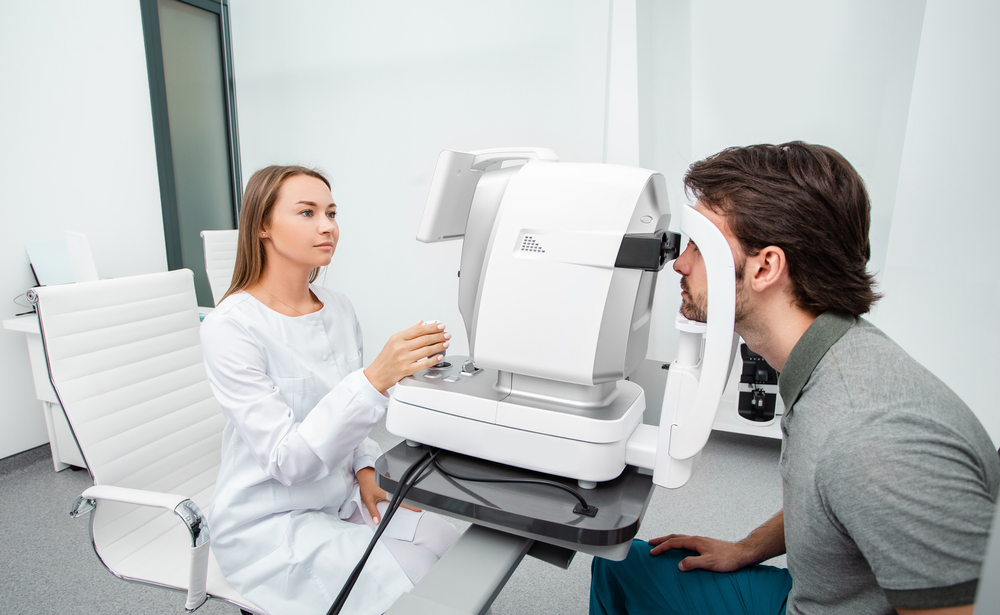
Why Comprehensive Eye Exams Are Essential for Your Overall Health
Regular comprehensive eye exams are not just about correcting refractive errors or updating your prescription. They are a comprehensive assessment of your visual system, designed to identify potential issues before they become more serious. By proactively addressing eye health concerns, you can take a significant step towards maintaining your overall well-being.
What is a Comprehensive Eye Exam?
A comprehensive eye exam is a thorough assessment of your visual system, conducted by an optometrist. This examination goes beyond the traditional vision screening, delving deeper into the health and function of your eyes. During a comprehensive eye exam, your optometrist will typically perform the following tests and assessments:
• Visual Acuity Test: This test measures your ability to see clearly at various distances, using an eye chart or other visual aids.
• Refraction: Your eye care provider will determine your precise refractive error, such as nearsightedness, farsightedness, or astigmatism, and provide a prescription for corrective lenses if needed.
• Slit Lamp Examination: This test uses a specialized microscope to examine the front of your eye, including the eyelids, cornea, iris, and lens, to detect any abnormalities or signs of disease.
• Eye Pressure Test: Also known as tonometry, this test measures the pressure inside your eye, which can indicate the presence of glaucoma or other eye conditions.
• Pupil Dilation: Your eye care provider may dilate your pupils with eye drops to get a better view of the internal structures of your eye, such as the retina and optic nerve.
• Comprehensive Eye Health Evaluation: Your eye care provider will thoroughly examine the overall health of your eyes, looking for signs of common eye diseases, such as cataracts, macular degeneration, and diabetic retinopathy.
By undergoing a comprehensive eye exam, you can gain valuable insights into the current state of your visual system and take proactive steps to maintain or improve your eye health.
Signs and Symptoms You May Need an Eye Exam
If you're experiencing frequent headaches, eye strain, blurred vision, difficulty focusing, or sensitivity to light, it may be time for an eye exam. Other signs that indicate the need for an eye check-up include squinting, seeing double, or noticing floaters and flashes of light. Sudden changes in your vision, such as difficulty reading or seeing distant objects, should not be ignored. Additionally, if you're dealing with dry, itchy, or red eyes, or if you have a family history of eye diseases, a comprehensive eye exam can help diagnose and address potential issues early.
What Can a Comprehensive Eye Exam Detect?
A comprehensive eye exam is not just about checking your vision; it can also detect a wide range of underlying health conditions. Your eyes are a window to your overall well-being, and a thorough examination can reveal signs of the following:
• Refractive Errors: Conditions like nearsightedness, farsightedness, and astigmatism can be easily identified and corrected with the appropriate prescription for eyeglasses or contact lenses.
• Eye Diseases: Comprehensive eye exams can detect the early stages of common eye diseases, such as cataracts, glaucoma, macular degeneration, and diabetic retinopathy, allowing for timely intervention and treatment.
• Systemic Diseases: Your eye care provider may be able to detect signs of systemic conditions, such as diabetes, high blood pressure, and certain types of cancer, through a comprehensive eye exam.
• Neurological Conditions: Eye exams can also reveal signs of neurological issues, such as multiple sclerosis, Parkinson's disease, and brain tumors, by assessing the optic nerve and other visual pathways.
• Pediatric Development: For children, comprehensive eye exams can identify vision problems that may affect their learning, development, and overall well-being, allowing for early intervention and treatment.
By undergoing regular comprehensive eye exams, you can take proactive steps to safeguard your overall health and well-being, ensuring that any potential issues are detected and addressed in a timely manner.
The Benefits of Regular Eye Exams for Early Detection and Treatment
Maintaining optimal vision and eye health is crucial for your overall well-being, and regular comprehensive eye exams are the key to achieving this. Comprehensive eye exams can identify the early stages of common eye diseases, such as glaucoma, macular degeneration, and diabetic retinopathy, before they progress and cause significant vision loss. Early detection allows for timely treatment, often leading to better outcomes and preserving your sight.
Regular eye exams ensure that your prescription for corrective lenses, if needed, is up-to-date and optimized for your current visual needs. This can enhance your visual performance in various aspects of your life, from work and driving to leisure activities and sports.
Maintaining optimal eye health and visual function can have a profound impact on your quality of life. By addressing vision-related issues and maintaining healthy eyes, you can enjoy greater independence, improved safety, and a heightened sense of well-being.
Schedule Your Eye Exam with Buena Park Eyecare Today
By making comprehensive eye exams a regular part of your healthcare routine, you can enjoy the benefits of clear, comfortable vision, early detection and treatment of potential issues, and a heightened sense of well-being. At Buena Park Eyecare, our experienced optometrists are dedicated to providing personalized, high-quality care to ensure your eyes and vision remain in optimal condition.
Schedule your comprehensive eye exam with Buena Park Eyecare and take the first step towards optimal vision and eye health. Visit our office in Buena Park, California, or call (714) 266-3949 to book an appointment today.




